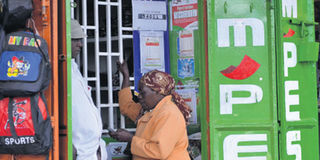New rules to stamp out money laundering

A woman withdraws money at an M-Pesa shop in Nyeri on April 16. Under new rules, transactions that exceed Sh100,000 every day or Sh300,000 a week will now be closely scrutinised. PHOTO/JOSEPH KANYI
What you need to know:
- The anti-money laundering guidelines are among those opened to public input with the wider objective of improving the National Payment System Act, 2011.
- Individuals with multiple accounts will also be put under greater surveillance with mobile payment service providers expected to link the different accounts and keep records.
Money transferring is to come under greater scrutiny as the government moves to reduce the risk of laundering and transactions meant to sustain terrorism.
Accounts exceeding Sh100,000 per day and personal accounts transacting Sh300,000 in a week will be put under the microscope to ensure they are not used by criminal elements.
According to draft Central Bank guidelines, mobile service providers will be responsible for managing operational risks through procedures and controls meant to curb such activities.
The anti-money laundering guidelines are among those opened to public input with the wider objective of improving the National Payment System Act, 2011.
Others are guidelines for provision of electronic retail transfers, regulation for the provision of a payment instrument, designation of a payment system and e-money regulation.
Money-laundering is the process of engaging in financial transactions that conceal or disguise the identity, source, location and destination of money received through illegal actions like drug peddling, gun-running and human trafficking.
Individuals with multiple accounts will also be put under greater surveillance with mobile payment service providers expected to link the different accounts and keep records.
According to the Central Bank, an average of Sh128 billion mobile money transactions are carried out every month. In 2012, the business transacted on mobile money transfer platforms was worth Sh1.5 trillion.
Mobile service providers will also be required to exercise due diligence similar to the Know Your Customer rules that guide banks’ relationships with their clients.
The providers will also be responsible for the actions of their appointed agents to be administered through agreements to prevent money laundering and funding terrorism.
They will be expected to report suspicious transactions immediately to a Financial Reporting Centre not later than seven days from the time the transaction was carried out.
Kenya enacted the Proceeds of Crime and Anti-Money Laundering Act, which came into effect in June 28, 2010, to enable the identification, tracing, freezing as well as seizure and confiscation of proceeds of crime.
“Money launderers look for unregulated and loosely supervised sectors to clean their dirty money to ensure their proceeds from crime are not detected by law enforcement agencies,” said Kenya Bankers Association chief executive officer, Habil Olaka.
Mr Olaka said that there is increased recognition that money transfer through mobile phones must be factored in the fight against money laundering.
It is estimated that about Sh7.3 billion has been laundered into Kenya in the last 20 years though the figures are not verified and could be substantially higher.




